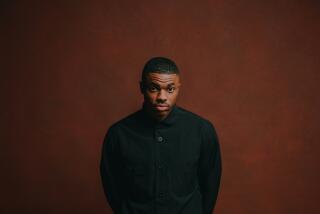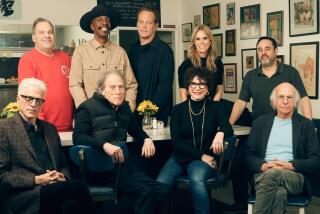Critic’s Notebook: At play with the department of ‘Parks and Recreation’
It’s so difficult to make a great television show that it seems miraculous at times that anyone even tries to do it. Think about it. As with any piece of writing, you need a great idea, interesting characters, resonant themes and a facility with language.
Here the novelist stops. Then, as with any sort of theatrical project, you need to bring in a host of temperamentally unpredictable people — actors, directors, producers, all manner of designers — all working toward one coherent vision. Here the playwright stops. Then you have to film the scenes, usually out of order, and edit them into something resembling the original idea. Here the filmmaker stops. Then you have to do this all over again, week after week and, if you’re lucky, year after year.
So the true test of a TV show is rarely its pilot or even its first season; in television, true greatness can only be achieved by tenacity and constant improvement. This season, “Parks and Recreation” became a great show, perhaps even a game-changing show.
From the beginning, it challenged the conventional wisdom of modern comedies. Like other current workplace shows, “Parks and Recreation” is absurdist, chronicling a group of entertainingly damaged people as they attempt to work together toward a common goal. But where most other shows — “The Office,” “30 Rock,” “Outsourced,” even “Community” — shade themselves dark, relying on the snappy if familiar humor of cynicism and self-involvement, creators Greg Daniels and Michael Schur took “Parks and Recreation” into the light, laid out a beach towel and stayed there. Unlike any show on television since perhaps “The Mary Tyler Moore Show,” it creates comedy, which is not to be confused with satire, out of workplace optimism.
In the middle of a recession, by the way. Which is an act of flat-out bravery and may explain why “Parks and Recreation” has struggled with ratings.
Amy Poehler, the show’s star, plays Leslie Knope, a preternaturally effervescent Indiana bureaucrat who is neither lovable antihero nor bewildered straight woman. Leslie defies all television (and cinematic for that matter) tropes. She is not a figure of fun — she may be perky, but she is not stupid — and does not have a hidden psychosis or agenda. She is just a regular gal, a solid B student, who believes in the power of positive thinking and is surrounded by a disparate, and at times desperate, group of people including the sweetly goofy Andy Dwyer (Chris Pratt), the hilariously troubled Ron Swanson (Nick Offerman) and the mildly normal Ann Perkins (Rashida Jones).
When it debuted, my colleague Robert Lloyd gave it a very good review; I was less impressed. I didn’t find Poehler a steady enough anchor for a cast of characters that seemed to be engaged in adjacent play rather than ensemble effort. But I liked it better the second season, and this time around I, like pretty much everyone in the critical community, flat out love it.
For one thing, the addition of Rob Lowe and Adam Scott as auditors Chris and Ben was pure genius. Lowe is better than he’s ever been as a man so genuinely nice he seems pathological until you realize that he’s just nice. And Scott, who honed his straight-man talents in “Party Down,” provides what the show previously lacked — a normal guy foil. The emergence of April (Aubrey Plaza) from bit player to deadpan, eye-rolling star also added a necessary dash of salt, proving that sunny optimism plays best when countered by its opposite.
But mostly “Parks and Recreation” proves that revolutionary TV — and I consider any show in which a blond female star is allowed to be nice but not ditzy, smart but not sarcastic, romantic but not desperate — need not emerge fully formed and ahead in the ratings. As this season has rolled out one terrific episode after another, “Parks and Recreation” proves once again that a good show, especially a good comedy, requires patience and constant seasoning but that the slow-cook model can work wonders when the networks will just give it a chance.
More to Read
The biggest entertainment stories
Get our big stories about Hollywood, film, television, music, arts, culture and more right in your inbox as soon as they publish.
You may occasionally receive promotional content from the Los Angeles Times.







